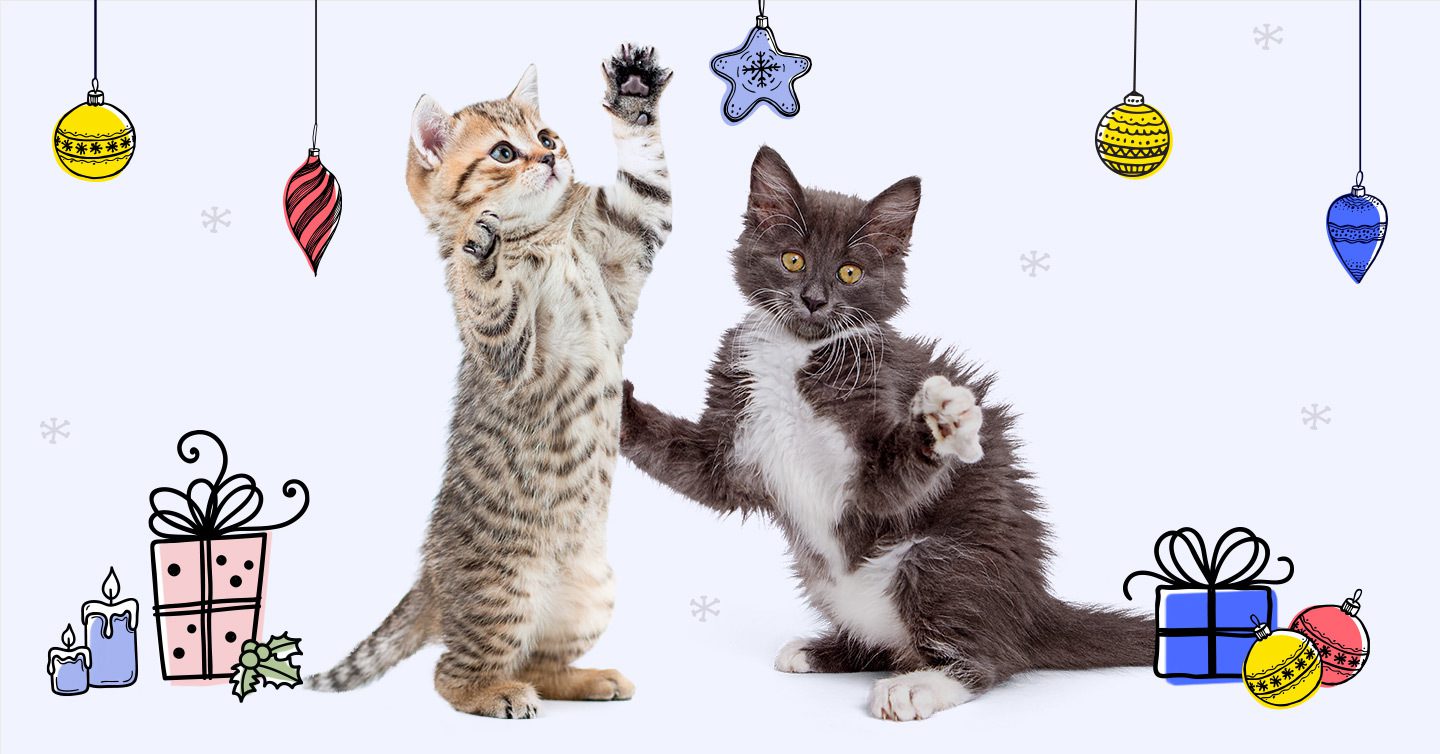Here comes Santa Claws and Hanu-cat! Your holiday checklist likely includes things like decorating the house, wrapping presents, and cooking tasty treats. But don’t furget to keep your kitten safe by following these easy tips:
1. Make the tree less tempting
A Christmas tree can look like a big toy to a frisky kitten. “I often receive calls about my cat patients who have been ‘up to no good’ after the tree has been trimmed,” says vet Dr. Stacy Choczynski. “Kitties climb Christmas trees, hide in them, eat them, eat ornaments, and even drink from their tree bases!” To protect against this behavior, securely anchor your tree and place ornaments and lights out of paws’ reach on higher branches. We recommend avoiding tinsel altogether, since it’s especially enticing and if ingested, can require surgical removal. Lastly, if you use a live tree, always vacuum or sweep stray pine needles ASAP, since they can puncture your pet’s intestines if ingested.
2. Use precaution with plants
Popular holiday plants like poinsettias, holly, or mistletoe can be toxic to pets and cause vomiting, diarrhea, and or more severe symptoms. If you discover that your kitty munched on any of these, call your vet or the ASPCA Poison Control number – your pet may need immediate treatment. “If a pet eats a poinsettia plant,” says Dr. Choczynski, “we might treat inflammation in the mouth and vomiting. For mistletoe ingestion, we would monitor and assist with low blood pressure, low heart rate, and difficulty breathing.” To avoid a trip to the vet, be sure to keep these plants out of paw’s reach, or don’t decorate with them at all.
3. Go slow with stocking stuffers
If you give your kitty a special stocking, don’t let them eat the treats all at once, since this could trigger stomach upset, vomiting, diarrhea, or even whole treats getting stuck in their windpipe or intestines. If you put toys in their stocking, look for ones that seem as indestructible as possible. You don’t want your cat to be able to chew off bits and pieces and swallow them – a cat-astrophe that could call for surgical removal.
4. Table the scraps
While it might be tempting to let your cat indulge as much as everyone else, rich, fatty foods like turkey or ham skin, brisket, and sausages can be much more hazardous to pets than to us. Firstly, meat bones could get stuck in their windpipe or digestive track and require surgical removal. Secondly, fatty foods can give kitty diarrhea or, in more severe cases, a potentially life-threatening disease called pancreatitis, with less-noticed symptoms like decreased appetite and weight loss. If you truly become powerless against the begging of your cat, vet Dr. Eloise Cucui from the Animal Care Centers of New York, says white meat chicken or turkey are fine in moderation: “I would recommend feeding no more than one ounce total of people food. Portion control is important!”
5. Avoid snacksidents
Keep all human beverages and snacks out of kitty’s reach, since alcohol, chocolate, and artificial sweeteners like xylitol are known to be toxic and big no-nos for pets. The most common symptoms of ingesting these substances include vomiting, diarrhea, decreased activity, and weakness. If your kitty gets into any of these goodies, call your vet or the ASPCA Poison Control number right away. One of the most important treats to watch out for is xylitol, advises Dr. Choczynski. “In the event that your pet eats sugar-free candy or gum from a stocking or candy bowl, do not finish your carol or egg nog! Grab your galoshes and go directly to the vet. Xylitol can cause a life-threatening low glucose level in cats and dogs.”
6. Be careful with candles
Flickering lights can feel like a toy to a curious kitten, so be sure to keep burning holiday candles and menorahs on sturdy, high surfaces like shelves or mantles, and never leave them unattended. A good rule of thumb is to blow the candle out before you leave the room.
7. Keep the wrapping under wraps
When wrapping and unwrapping gifts, make sure to keep ribbons, string, and tinsel away from your kitten, since they look like tempting toys but can cause serious stomach and intestinal damage. Also beware of leaving wrapped gifts under the tree for this same reason.
8. Don’t cause discord with cords
Teething kittens love to chew electrical cords, which could result in accidental electrocution or swallowing bits of cord. Exposed indoor or outdoor wires should be taped to the wall or sides of the house, and any wires extending away from the wall should be wrapped in hard protective plastic.
9. Keep kitty feline calm
The holidays can be an especially stressful time for cats, who are sensitive to any changes in their environment. If you have guests, “make sure your cat has a safe place to get away from the festivities,” says Dr. Cucui. “While some pets can be party animals and love to be around new people, others may become quite stressed or anxious around unfamiliar sights and sounds and may prefer to stay by themselves in a quiet room.”
Dr. Meghan Dail from Mid Atlantic Cat Hospital also recommends soft music and pheromone diffusers to keep kitty calm: “Studies have shown that soft, calming music can help lower a cat’s blood pressure and heart rate. Any time we have company over, we stream cat music in the rooms where they tend to retreat to. Devices like Amazon Echos even have apps for this! Calming pheromone diffusers (such as Feliway) are also helpful during the holidays to help reduce your cat’s stress level.” Lastly, don’t forget to move your cat’s water bowl into the room where they’re hiding – otherwise they may stop drinking and become dehydrated, which puts them at increased risk for kidney disease. Heightened anxiety can also cause inappropriate urination and warrant a trip to the vet, since you’ll want to be sure kitty hasn’t developed a bladder infection.
10. Add pet insurance to your shopping list
The most furbulous gift you can help give your cat this holiday is a healthy life! If any of these cat-astrophes do happen, the best way to be prepared is to get pet insurance for your kitten ahead of time. According to a financial survey from Bankrate, only 39% of Americans have enough in savings to cover a $1,000 emergency – pet insurance can help cover the costs of any emergency care, surgery, or treatment your kitty would need to get better.
We hope these tips help your whole fur family have a safe & happy holiday season! If your cat gets into anything they shouldn’t, call your veterinarian immediately for advice instead of waiting for serious symptoms to develop. We also recommend keeping that ASPCA Poison Control number readily available!




